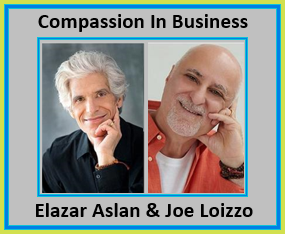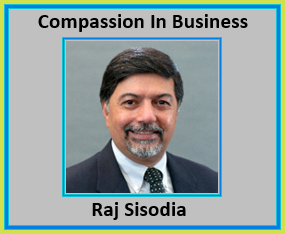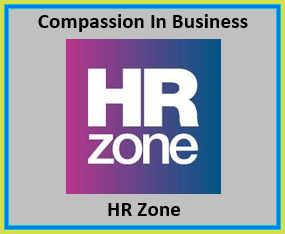Compassion In Business : Quotations
***
While it should not surprising that The Compassion Renaissance would have a great influence on fields such as healthcare and social services, it is increasing its influence on big business.
***
Elazar Aslan & Joe Loizzo
BOOK: Joe Loizzo & Elazar Aslan, Boundless Leadership: The Breakthrough Method to Realize Your Vision, Empower Others, and Ignite Positive Change, Shambhala, Dec. 21, 2021
“The moral imperative that drives this book is that the path from our old way of being to the new one, despite the steep learning curve involved, is traversable by anyone who wishes to walk it. One’s leadership no longer needs to be guided by the pessimistic projections of a culture of self-limiting beliefs, when we can as easily lead by the boundless imaginings of a world of possibilities. With businesses now responsible for more than just profits, boundless leaders can arise and create a world we are proud to leave for our children and our children’s children.” — Elazar Aslan
ELAZAR ASLAN, MBA, PCC is an executive advisor, speaker, and entrepreneur. After a successful career as a business executive, he became a professional coach over a decade ago, bringing his meditative practice and leadership principles to corporations including Chase, D&B, MasterCard, American Express, and ADP, as well as hyper growth start-ups. He is the founder of A Day of Kindness in Philadelphia, President of the Tibetan Buddhist Center of Philadelphia, and a Nalanda Institute board member. For more about Elazar, visit elazaraslan.com.
Book is endorsed by Daniel Goleman, author of Emotional Intelligence — “A breathtakingly original approach to leadership, both practical and visionary. Anyone who cares about our future and how leaders can help shape a better future will find Boundless Leadership a source of inspiration.”
“In this empowering synthesis of contemplative insights and the science of the brain and mind, Joe Loizzo and Elazar Aslan offer a guide to personal and professional leadership that helps us find deep inner resources of strength in ourselves and others. The approach of this guide to being an impactful, compassionate, and visionary leader is built upon cutting-edge science and inspired by the wisdom of meditative practice, providing us the best of rigorous research and heartfelt truths that can help us all to create a new world of compassion, connection, and creativity.”—Daniel J. Siegel, MD, bestselling author of Mindsight; clinical professor, David Geffen School of Medicine at UCLA and executive director, Mindsight Institute
Brené Brown
For years, people have bundled compassion with never saying No. if you are empathic, you are compassionate and caring, you will be there for your friends and family even if you are drained and out of energy. A lot of us are conditioned to think that if we place ourselves first, we are being selfish and not at all “humane.” But for Brené Brown, compassion and boundaries are not options in a single choice question. [Raven Montmorency, “Brené Brown on Compassion and Boundaries,” Nticement, July 22, 2021]
Casandra Brené Brown is an American research professor, lecturer, author, and podcast host. Brown is known in particular for her research on shame, vulnerability, and leadership. A long-time researcher and academic, Brown became famous following a widely viewed TED talk in 2010.
Jacqueline Carter
BOOK: Rasmus Hougaard, Jacqueline Carter & Gillian Coutts, One Second Ahead: Enhance Your Performance at Work with Mindfulness, Palgrave, Nov. 2015.
Book: Rasmus Hougaard & Jacqueline Carter, Compassionate Leadership: How to Do Hard Things in a Human Way, Harvard Business Review Press, Jan. 18, 2022.
Cory Custer is on the leading edge of highlighting the importance of compassion in the workplace. He’s the Director of Compassion at Seattle-based wealth management firm Brighton Jones.
“We believe compassion is something we can all get better at with some study. Surprisingly, it takes very little practice to increase our compassion,” says Custer.
Brighton Jones leaders enroll in the firm’s
Mindfulness-based Emotional & Social Intelligence (MESI) course, which
teaches practices aimed at improving their compassion for one another and their
clients.
“We tell our people that whatever your role is—team leader,
technical expert or a relationship manager—remember that people don’t care how
much you know until they know how much you care,” Custer explains. “I think
that speaks to the primacy of relationships in leadership, and nothing builds
relationships more than compassion.” [Jennifer V. Miller, “The business
benefits of being a compassionate leader, Economist Education,” Undated]
Fred Kofman
Wisdom without compassion is ruthlessness; compassion without wisdom is folly. (2008)
BOOK: Fred Kofman Ph.D. & Ken Wilber, Conscious
Business: How to Build Value through Values, Sounds True, Oct. 1, 2013
Rasmus Hougaard
According to Rasmus Hougaard, Managing Director of Potential Project, leaders who dare to show compassion are rewarded with team members’ loyalty. He cites research by Professor Shimul Melvani, from the University of North Carolina’s Fliegler School of Business, who found that compassionate leaders have increased levels of engagement, and have more people willing to follow them.
“When we as leaders value the happiness of our people, they feel appreciated. They feel respected. And this makes them feel truly connected and engaged. It’s no accident that organisations with more compassionate leaders have stronger connections between people, better collaboration, more trust, stronger commitment to the organisation, and lower turnover,” says Hougaard, whose consultancy provides leadership development training in the competencies of compassion, mindfulness and selflessness. [Jennifer V. Miller, “The business benefits of being a compassionate leader, Economist Education,” Undated]
Peter Senge
~ Mission Statement - Center for Systems Awareness
A renaissance in education is already here, but, as they say in the tech world, it is not evenly distributed, and its deeper nature is obscured by diverse and seemingly disconnected guiding ideas, like project-based learning, social and emotional learning, mindfulness, whole-child learning, design thinking, systems thinking, trauma-informed classrooms, flipped classrooms and learner-centered pedagogy. The Center for Systems Awareness exists to advance systems change in education based on the idea that profound inter-connectedness sits behind all these ideas and connects them.
~ Compassionate Systems
In our work with the Compassionate Systems network, we view “compassionate integrity” as an outcome of what we are seeking to help grow in students and teachers – to have alignment between how we think, feel and act. The term integrity comes from a root of “wholeness” in Latin. Likewise, what we wish to help our students grow is the ability to not only think compassionately but to also feel and live compassionately by virtue of an ever-unfolding awareness of interconnectedness. This can extend naturally from feeling of connection to oneself and others to feeling connected to the consequences of my actions at greater distances of time and space, starting with simple acts like holding in awareness, for example, how in charging our mobile devices we use electricity that in most countries comes from burning coal. This feeling of connectedness underpins a persistent inquiry to understand ever more broadly the consequences of our actions as the root of all ethical behavior. This inquiry encompasses my choices as a citizen and a consumer, from the energy I use to the food I eat, to the products I buy (e.g., the water and carbon footprints of energy and food, the just treatment of workers, the wellbeing of animals – even on the other side of the world). Since we can never see all of the systems within which our actions unfold, this spirit of genuine curiosity and openness is the real hallmark of a systems thinker, and the cultivated experience of interconnectedness that of a compassionate systems thinker.
Peter Michael Senge (born 1947) is an American systems scientist who is a senior lecturer at the MIT Sloan School of Management, co-faculty at the New England Complex Systems Institute, and the founder of the Society for Organizational Learning (founded in 1997). He is known as the author of the book The Fifth Discipline: The Art and Practice of the Learning Organization (1990, rev. 2006).
Emma Seppala
EXCERPT: So why does compassion provide such a boost to employee well-being? One reason may be its impact on social connection. Research by Ed Diener and Martin Seligman suggests that connecting with others in a meaningful way helps us enjoy better mental and physical health and speeds up recovery from disease; research by Stephanie Brown at Stonybrook University has shown that it may even lengthen our life.
Despite this research, managers may shy away from compassion for fear of appearing weak. Yet history is filed with leaders who were highly compassionate and very powerful—Mother Teresa, Martin Luther King, and Desmond Tutu, to name a few. They were such strong and inspiring leaders that people would drop everything to follow them. Wouldn’t any manager wish for that kind of loyalty and commitment?
Support for this view comes from research by Jonathan Haidt at New York University. His research shows that seeing someone help another person creates a heightened state of well-being that he calls “elevation.” Not only do we feel elevation when we watch a compassionate act, but we are then more likely to act with compassion ourselves. [Emma Seppala, “Why Compassion in Business Makes Sense,” Greater Good Magazine, Apr. 15, 2013]
Raj Sisodia
A leader who operates with a primary emphasis on self-interest naturally views other people as a means to that end. You cannot be a true leader if you operate at that level of consciousness.
Selfless does not mean eradicating the ego; that is nearly impossible. It is about harnessing the ego in healthy ways. As the Dalai Lama has said, 'We cannot and need not eradicate our ego; rather, we must make sure it is a serving ego and not a deserving ego. [John Mackey & Raj Sisodia, Conscious Capitalism: Liberating the Heroic Spirit of Business, Harvard Business Review Press, 2013]
Caroline Vernon
Most employees’ goal is to work in an environment of respect that cultivates their unique talents, but does this workplace dynamic increase productivity? Over the past decade, Google’s Project Aristotle worked to define the variables that contribute to creating high-performing teams. With that goal in mind, researchers from the project collected a wide array of data ranging from the personality traits of group members to how the group members liked to be rewarded. Researchers found that the most significant factor in high-performing teams was psychological safety, or “a sense of confidence that the team will not embarrass, reject or punish someone for speaking up.” In other words, the high-performing teams were compassionate. [Caroline Vernon, ”Compassion As A Business Objective: Why It Matters And How To Cultivate It,” Forbes, Sep 2, 2021]
Jeff Weiner
EXCERPT: As the Dalai Lama explains, if you are walking along a trail and come along a person who is being crushed by a boulder, an empathetic reaction would result in you feeling the same sense of crushing suffocation and render you unable to help. The compassionate reaction would put you in the sufferer’s shoes, thinking this person must be experiencing horrible pain so you’re going to do everything in your power to remove the boulder and alleviate their suffering. Put another way, compassion is a more objective form of empathy. This idea of seeing things clearly through another person’s perspective can be invaluable when it comes to relating with others, particularly in tense work situations.
For example, when strongly disagreeing with another, most of us have a tendency to see things solely through our own world view. In those situations, some will immediately assume that the other person is ignorant and/or has nefarious intentions. Your mind immediately turns to the thought, “How could they possibly not agree with me?”
In these circumstances, it can be constructive to take a minute to understand why the other person has reached the conclusion that they have. For instance, what in their background has led them to take that position? Do they have the appropriate experience to be making optimal decisions? Are they fearful of a particular outcome that may not be obvious at surface level? Asking yourself these questions, and more importantly, asking the other person these questions, can take what would otherwise be a challenging situation and transform it into a coachable moment and truly collaborative experience. [Jeff Weiner,” Managing Compassionately,” LinkedIn, Oct. 14, 2012]
https://www.linkedin.com/pulse/20121015034012-22330283-managing-compassionately/
Monica Worline & Jane E. Dutton
BOOK: Monica C. Worline & Jane E. Dutton, Awakening Compassion at Work: The Quiet Power That Elevates People and Organizations, Berrett-Koehler Publishers, Feb. 20, 2017]
Publisher promotional copy: Caring Is a Competitive Advantage - Suffering in the workplace can rob our colleagues and coworkers of humanity, dignity, and motivation and is an unrecognized and costly drain on organizational potential. Marshaling evidence from two decades of field research, scholars and consultants Monica Worline and Jane Dutton show that alleviating such suffering confers measurable competitive advantages in areas like innovation, collaboration, service quality, and talent attraction and retention. They outline four steps for meeting suffering with compassion and show how to build a capacity for compassion into the structures and practices of an organization—because ultimately, as they write, “Compassion is an irreplaceable dimension of excellence for any organization that wants to make the most of its human capabilities.”
AT WORK. The new book by Monica Worline and Jane Dutton opens our eyes to the power of and importance of compassion in organizations and reveals caring as a competitive advantage that fuels innovation, service quality, adaptability, retention, and more.
Three of the leading figures of compassion science/cultivation give Monica C. Worline & Jane E. Dutton work the highest praise possible.
“What we produce and how we produce the goods and services all around us is one of the most important human issues of our age. From the sweatshops of Asia to the boardrooms of high technology, we know that there can be considerable competitive pressures that cause great stress and at times deeply immoral behavior. Dutton and Worline are world leaders and pioneers in the extraordinarily important turn toward more compassionate work. Here is a book that outlines in detail some of the challenges a compassionate approach to work confronts and how to deal with them. This is an outstanding book that will be a classic for years to come. It will aid greatly the human endeavor to create a more compassionate world.”— Paul Gilbert, PhD, FBPsS, OBE, Professor, Centre for Compassion Research and Training, College of Health and Social Care Research Centre, University of Derby
“Work is a place where most of us spend a large percentage
of our waking hours. Yet for many, the workplace remains a source of stress and
anxiety. In their landmark book, Worline and Dutton give us an overview of the
problem and science based solutions. It will help individuals not only in the
workplace but in their lives. For the employer, it is a powerful tool to give
employees meaning in their work and to increase creativity, productivity, and
ultimately shareholder value.”
—James R. Doty, MD, Clinical Professor of Neurosurgery and founder and
Director of the Center for Compassion and Altruism Research and Education,
Stanford University School of Medicine, and New York Times bestselling author
of Into the Magic Shop
“The go-to book on the hottest new trend in the corporate world: compassion.
Worline and Dutton have spent years researching positive deviance: how to bring
greater humanity to the workplace. Their work is groundbreaking: a
compassionate workplace is happier, healthier, and more productive. Packed with
real-world examples of the many companies they have advised and researched,
Awakening Compassion at Work is for all those who want to see themselves
and their company succeed to its full potential.”
—Emma Seppälä, PhD, Science Director, Center for Compassion and Altruism
Research and Education, Stanford University, and author of The Happiness Track
HR Zone
What is compassionate management? -- Today’s employees don’t just appreciate sympathetic words and a bit of understanding when it’s called for – they expect them. After all, since when was the workplace an excuse for not behaving like a decent human being?
Empathy is all well and good, but I’m among the growing number who view it as being ultimately pointless unless accompanied by positive action.
Compassionate management is an approach that takes empathy to the next level. It involves taking the time to actually step into someone else’s shoes and understand their emotions, stresses, weaknesses and strengths so you are better placed to take action.
Those leaders who give it a try will soon find the effect of going the extra mile and providing appropriate support far outweighs the additional effort as employees experience a huge boost which in turn leads to greater commitment to their manager and their organisation. [Samantha Collins, ”Compassionate management: the softer side of leadership,” HRZone, Mar. 4, 2014]
***

















Comments
Post a Comment